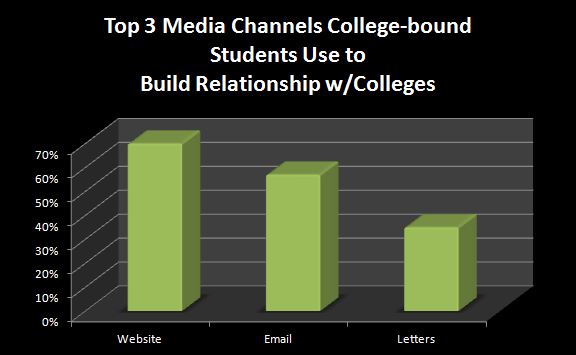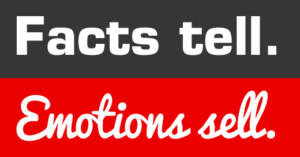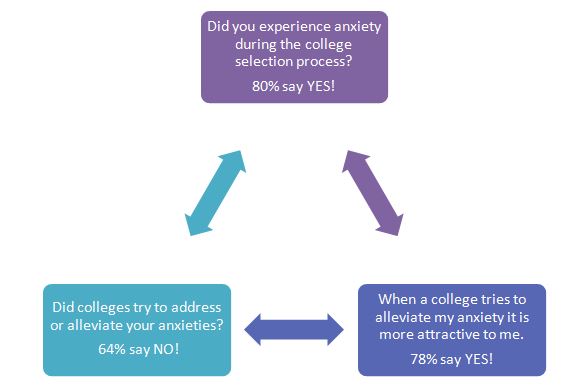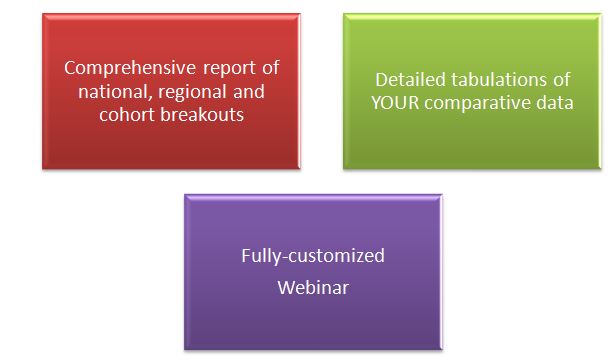Relationships Aren’t Just Important, They are Crucial
 Successful admission professionals understand that developing a connection with a student can greatly increase his or her commitment to the college and improve the likelihood of enrollment. In fact, our studies have demonstrated that 8 in 10 students say the relationship they formed with their chosen college was influential in their decision to enroll.
Successful admission professionals understand that developing a connection with a student can greatly increase his or her commitment to the college and improve the likelihood of enrollment. In fact, our studies have demonstrated that 8 in 10 students say the relationship they formed with their chosen college was influential in their decision to enroll.
If there is any doubt in your mind about the influence of relationship building in the enrollment process, consider this additional data: The separation between the chosen college and the second choice is wide with regard to the key factors that influence relationship building.
For example, 61% of students participating in the national study, “The Relationship Dynamic,” indicated that the statement,“Admission reps were sincere and cared” applied to their chosen college but only 25% said it applied to their second choice college. With reference to the statement, “The college understood me,” 59% said it applied to their first choice school vs. 22% to their second choice.
Forming a connection to any brand, including a college, is a nuanced, and often confusing, process with many components. And, one of the most mystifying of those components today is the influence of social media and mass communications. With our most recent national co-sponsored study, “Emotional Motivators,” we set out to bring some clarity to one of the top questions facing admission offices and college marketing departments today: Which communication channels are most effective in winning the hearts and minds of prospective students?
10,000+ College-bound Students Evaluated 16 Channels of Social Media and Mass Communications
In “Emotional Motivators” we asked students directly, “Through which of the following communication channels did you form or strengthen your emotional connection to your chosen colleges prior to enrolling?”
We presented students with 16 channels to choose from (they could select any or all).
Included in the list were: Facebook, Texting, Twitter, Snapchat, Email, Phone calls, YouTube, Instagram, Brochures, Letters/Postcards, Pinterest, Linkedin, College website, Mobile app, Live chat, and Personalized website.
So, which are the top three?
Topping the List at #1: The College Website 
Your website is the strongest mass communications tool in your arsenal for creating a bond with prospective students. There are many experts in website development that can guide you in evaluating your website. We advise our clients to continually evaluate their college’s website from the point of view of the students they are recruiting. You may not be surprised that it’s #1. But ask yourself these key questions:
- Does it truly enable students to see and feel what their life will be like at your school? Does it do this for differing groups of people?
- Does it connect them (emotionally) with current students on your campus?
- Is our website engaging? Does it create excitement? Do the visuals tell stories that will resonate with the students you are recruiting?
- Can prospective students and their parents find the answers to their questions easily?
- Is there a quick and easy way to make contact with an admission counselor? (You would be surprised how many college websites don’t provide admission counselor information.) Is there a photo and bio info for each counselor to make them more approachable for students?
#2: E-mail Communications
This is likely to astonish many who have questions about the continuing effectiveness of email as a communication tool. However, “Emotional Motivators,” confirms what we have seen in our other studies. You can create an emotional bond with a student and you can build on that bond over time with effective use of email. You’ll know if the bond was never created in the first place when students start unsubscribing and yell at you to “STOP SENDING ME EMAILS!”
However, well-crafted, personalized emails can be very meaningful and can contribute in a very big way to building a bond between the student and college.
#3: Letters and Postcards
Good news for the USPS, letters and postcards continue to be a compelling means to connect with prospective students. Like email, students respond best to personalized letters and cards. Many students said that humorous postcards actually help relieve stress during the college selection process.
Today we are revealing the top three channels but we will share the complete list with you soon including some of the intriguing findings we have uncovered within each category. For instance, would you be surprised to learn that Instagram tested stronger than Facebook? With 800 million users engaging with the service on at least a monthly basis, and 500 million users daily, Instagram has quickly become a force in social media and prospective students tell us that it is more effective in building a bond with colleges than Facebook.
If you can’t wait to see the entire list, click here and we will email the complete list to you.
Our national studies explore many data points; variations between students in the deep funnel phase of recruitment, private/public college students, and males/females, just to name a few. Co-sponsoring institutions receive an even deeper view of their own pool of students. If you would like this information for your college, give me a call or shoot me an email.
[Full disclosure: The study is underway and I am sharing a few preliminary findings. However, at the current sample size, the margin of error at the 95% level is +/- 1%.]
If I can help you with your recruiting efforts in any way, please feel free to call or email me. I would love to talk to you about our powerful and effective Yield Enhancement System (YES). Admission offices use this system to improve their mass communications efforts, have more effective one-on-one interactions, and ultimately, boost their yield. My contact information is at the bottom of this post.
Continue the conversation on Twitter @LongmireCo. For more information about Longmire and Company’s Interactive Counselor Training Program, click here. Subscribe to Versions of Conversion today so you don’t miss any of this highly-valuable information.
 Rick Montgomery is as an Enrollment Strategist at Longmire and Company. With over 20 years in higher education marketing, he brings an innovative approach to helping colleges and universities meet their enrollment goals. Rick can be reached at 913/492.1265 x.708 or via email at rmontgomery@longmire-co.com.
Rick Montgomery is as an Enrollment Strategist at Longmire and Company. With over 20 years in higher education marketing, he brings an innovative approach to helping colleges and universities meet their enrollment goals. Rick can be reached at 913/492.1265 x.708 or via email at rmontgomery@longmire-co.com.

 Bob Longmire is President of Longmire and Company, Inc. He is a recognized expert on the topic of how prospective students and parents form their college selection decisions – and how colleges can use that knowledge to grow and control their enrollment. He can be reached at (913) 492-1265, ext 709 or at
Bob Longmire is President of Longmire and Company, Inc. He is a recognized expert on the topic of how prospective students and parents form their college selection decisions – and how colleges can use that knowledge to grow and control their enrollment. He can be reached at (913) 492-1265, ext 709 or at Preliminary findings from our latest national co-sponsored higher education study are definitive on this subject: Your prospective students want/need you to understand the feelings and emotions they are experiencing as they navigate the college selection process.
Preliminary findings from our latest national co-sponsored higher education study are definitive on this subject: Your prospective students want/need you to understand the feelings and emotions they are experiencing as they navigate the college selection process.
 As a co-sponsor you receive a comprehensive set of tabulations relating to your pool of students, as well comparative data of others in your cohort and other market segments. You’ll also receive the national summary report before its widespread release.
As a co-sponsor you receive a comprehensive set of tabulations relating to your pool of students, as well comparative data of others in your cohort and other market segments. You’ll also receive the national summary report before its widespread release. As summer approaches, enrollment managers and admission directors expand their focus to critical issues like professional development, marketing planning, research and pre-enrollment service initiatives. Meanwhile, many colleges are still in the throes of making their 2017 class. According to the recently released NACAC
As summer approaches, enrollment managers and admission directors expand their focus to critical issues like professional development, marketing planning, research and pre-enrollment service initiatives. Meanwhile, many colleges are still in the throes of making their 2017 class. According to the recently released NACAC 
